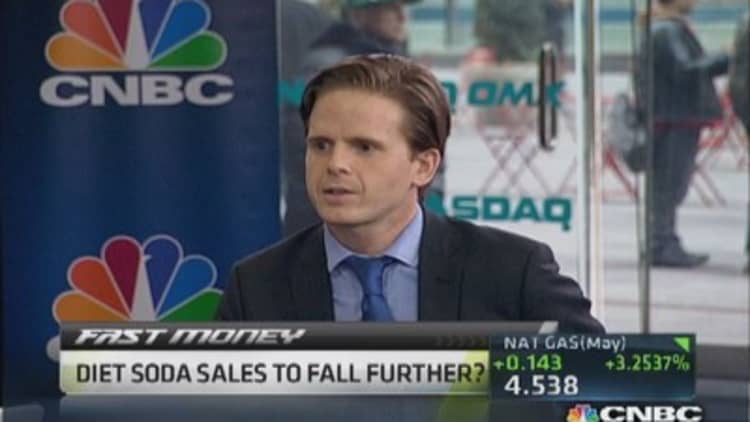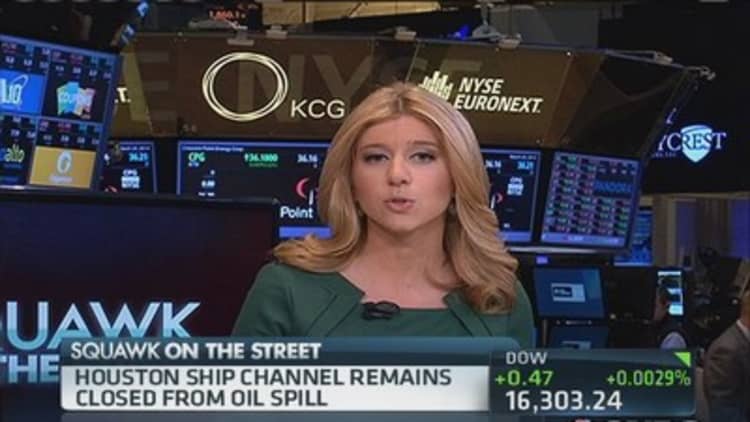
Coca-Cola might look focused on conquering the world, but it has a nagging problem right at home: Selling Diet Coke to Americans.
Declining unit sales of fizzy drinks in the U.S. are nothing new for the likes of Coca-Cola and PepsiCo. Carbonated beverage volume fell every year between 2005 and 2012, according to Beverage Digest, which is expected to release 2013 data in the next several days.
Until recently, the beverage companies had a solution to the problem that allowed them to maintain steady revenue growth. Here's how it worked: Over the last few years, the volume of carbonated beverages sold in the U.S. would normally fall by a fraction of a percentage point if prices were held steady.
If companies increased prices by 1 percent, volumes would decline further, but by a smaller 0.8 percentage point, according to J.P. Morgan analyst John Faucher. That allowed companies to boost revenue by raising prices, which they generally did.
What's changed recently is the baseline volume decline. In the period from last July through January, the average decline in volume would have been nearly 4 percentage points, assuming prices didn't change, Faucher said. The data in his study include large-format retailers like grocery chains but exclude some others like small shops and vending machines.
The likely culprit: Diet soda. While health concerns around calories are nothing new, there has recently been a pickup in negative publicity about artificial sweeteners. Indeed, Coca-Cola said on its last investor call that sparkling beverage volume in North America fell 2 percent in 2013, largely due to Diet Coke. Unlike 2012, when Coca-Cola was able to raise prices faster than volume fell, it was only able to keep sparkling revenue roughly flat for North America in 2013.
Weak U.S. soda sales, both regular and diet, pose a serious threat to Coca-Cola. North American sparkling beverages account for about 30 percent of companywide revenue, estimates Nik Modi, an analyst at RBC Capital Markets. Diet Coke is the second-best selling carbonated drink in the country after regular Coke, according to Beverage Digest's latest data. And if concerns about the safety of Diet Coke take hold in the U.S., consumers in other major markets like Europe could soon take notice.
The obvious solution is to change consumer perception about health risks or introduce a new Coca-Cola product using non-chemical sweeteners. But both Coca-Cola and Pepsi have introduced many versions of their drinks over the years. Some, like Coke Zero, have been very successful, suggesting the company has a shot at coming up with an answer. But it's hard to guess how long that will take.

Another option is to reduce prices to keep volumes intact. But that is probably a short-term solution to a bigger problem. Even if it results in higher revenue, it hurts profit margins. And it can be tough to raise prices in the future if consumers grow accustomed to big promotions.
Large price cuts may not even stave off volume declines. Coca-Cola-owned sparkling beverage prices declined by 4.5 percent from a year earlier in the four weeks through March 15, but volumes only rose 3.8 percent, according to domestic Nielsen data cited by Ali Dibadj, an analyst at Sanford C. Bernstein. The overall impact was to increase market share slightly in sparkling drinks but revenue declined, Dibadj said.
The better option is probably to continue on the path of price hikes, which Coca-Cola has indicated it wants to do. The tobacco industry went through a phase of aggressive discounting a couple of decades ago when health concerns impacted volumes. But Big Tobacco ultimately focused on boosting prices and the industry has largely been successful.
That said, soda and cigarettes are different because consumers can switch from Diet Coke to another non-cola beverage—even bottled water. Dibadj points out that the price premium of carbonated drinks over bottled water in the U.S. has increased from 125 percent in 2010 to more than 150 percent today. Any moves to widen that price gap further may make it more tempting to stop drinking soda.
All this comes as Coca-Cola has been through a rough patch. Since the start of 2012, Coca-Cola shares have risen 10 percent, compared with 25 percent for PepsiCo and 47 percent for the S&P 500. And earlier this week, large Coca-Cola shareholder Wintergreen Advisers publicly complained about the company's 2014 executive compensation plan, which it argued could dilute shareholders by 14 percent. The company disputed the claim, saying that the awards would only be paid if employees met specific goals. Coca-Cola and Wintergreen both declined to comment to CNBC Digital.
Coca-Cola, given its global brand strength and pricing power in most markets, deserves to trade at a premium multiple. But the stock is no bargain with an enterprise value, including net debt, of 14.2 times consensus 2014 earnings before interest, taxes, depreciation, and amortization. Unless the company gets its diet problem under control, more investors may soon be up in arms.

